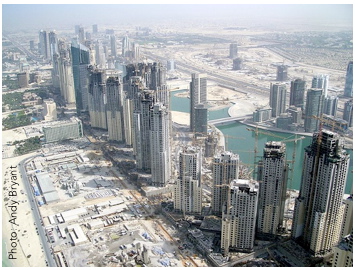
The shimmering steel beacon of Dubai often beckons to business travellers.
The region has a myriad of financial possibilities for entrepreneurial Britons, especially in the capital of Abu Dhabi, arguably the political and economic heart of the United Arab Emirates. Certainly I know a few friends who have moved to Dubai to make their magical pennies grow!
This city is also a big draw-card for Britons branching out with overseas business operations.
However, there are important banking differences between Britain and the UAE. And all business travellers should know about them, before embarking on the adventure of relocation.
Before Getting On the Plane
It’s a good idea to bank with a British institution that has a branch presence at the chosen destination. Plenty of banks from home do have offices in central Abu Dhabi or Dubai: this will be a godsend when trying to get urgent transactions attended to, in the early days.
It’s also important to compare several UAE banks for the best deals in regards to fees, a low interest rate and benefits like an overdraft. While HSBC current accounts are a safe bet, the fees and quality of service will vary quite markedly between different UAE bank accounts, so it pays to get the best deal before boarding the plane.
Getting A UAE Current Account
After touching down, one of the initial shocks to the senses will be the new currency. The Dirham in the UAE is abbreviated to AED or Dhs. Denominations include: one thousand, five hundred, two hundred, one hundred, fifty, twenty, ten and five notes. Coins in the currency come in a one dirham, fifty and a quarter. To get the most accurate and up to date exchange rate, download a free currency converter app for iPhone and Android. This will give up to the minute exchange rates. In the early days, this can help with the teething problems of adjusting to the new currency and avoid overzealous spending.
Certain international banks such as HSBC and many others offer offshore accounts. This can be an effective and streamlined way for expats to manage their money while in the UAE.
Opening a UAE current account is relatively simple, but you will have to bear in mind that the account will remain in a half-active state until a valid visa is sighted and verified by the institution. During this half-active stage most functions like making cash or cheque deposits are not permitted. However, it is permitted to make credit card transactions in the meantime, before the visa is sorted out: just be wary of getting too slap-happy with the plastic, as British banks will charge international fees for doing so.
Old Fashioned Banking
The level of service for online facilities for UAE banks vary wildly. Generally, the preferred method to make transactions is in person. Also remember that banks follow different times from the homeland: UAE opening times go from 8 am to 2 pm weekdays apart from Friday, when branches are closed. However, some of the larger and central banks will be open for longer hours, so it pays to get online to check. All in all, there are plenty of well-known benefits for expats wanting to move to the UAE, such as no tax and high income expectancy. But before starting your new life under Dubai’s sun you will have to be aware of the stark differences in the business environment: as you get to know more about these, a plethora of opportunities will open up in front of you.
You must log in to post a comment.